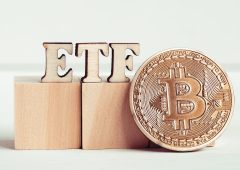Will HBO’s New Series Really Reveal Bitcoin’s Creator?
07.10.2024 10:00 1 min. read Kosta Gushterov
The cryptocurrency world has been buzzing recently following the announcement of a new series by HBO titled "Money Electric: The Bitcoin Story."
The excitement surrounding the show stems not just from its content, but from the sensational claim that it will finally unveil the true identity of Satoshi Nakamoto, the enigmatic figure behind Bitcoin and its foundational white paper released in 2008.
This bold assertion has generated considerable anticipation leading up to the show’s release on October 8, impacting market sentiments as many eagerly await the unveiling of one of the most intriguing mysteries in modern history.
Amidst the speculation, several long-standing theories about Nakamoto’s identity have resurfaced, with one of the prominent suggestions being Adam Back, the CEO of Blockstream. Back is notably one of the few individuals mentioned in the Bitcoin white paper.
However, he has consistently refuted claims of being Nakamoto, including a recent denial in response to a follower’s bet on Polymarket suggesting he might be the elusive creator.
Furthermore, Back expressed skepticism regarding HBO’s claims, implying that the documentary might not provide accurate information since the true identity of Satoshi remains unknown. His choice of words—saying “is” instead of “was”—has sparked further speculation, leading some to wonder if the creator of Bitcoin is still alive and possibly among us today.
-
1
Binance Could Introduce Golden Visa Option for BNB Investors Inspired by TON
07.07.2025 8:00 1 min. read -
2
Weekly Recap: Key Shifts and Milestones Across the Crypto Ecosystem
06.07.2025 17:00 4 min. read -
3
Trump Imposes 50% Tariff on Brazil: Political Tensions and Censorship at the Center
10.07.2025 7:00 2 min. read -
4
Key Crypto Events to Watch in the Next Months
20.07.2025 22:00 2 min. read -
5
USA Imposes Tariffs on Multiple Countries: How the Crypto Market Could React
08.07.2025 8:30 2 min. read
Bitwise CIO: The Four-Year Crypto Cycle is Breaking Down
The classic four-year crypto market cycle—long driven by Bitcoin halvings and boom-bust investor behavior—is losing relevance, according to Bitwise CIO Matt Hougan.
Strategy to Raise Another $2.47 Billion for Bitcoin Acquisition
Strategy the company formerly known as MicroStrategy, has announced the pricing of a new $2.47 billion capital raise through its initial public offering of Variable Rate Series A Perpetual Stretch Preferred Stock (STRC).
AI Becomes Gen Z’s Secret Weapon for Crypto Trading
A new report from MEXC reveals a striking generational shift in crypto trading behavior: Gen Z traders are rapidly embracing AI tools as core components of their strategy.
3 key Reasons Behind Today’s Crypto Market Drop
The crypto market shed 1.02% in the past 24 hours, led by a sharp Bitcoin drop and fading altcoin interest.
-
1
Binance Could Introduce Golden Visa Option for BNB Investors Inspired by TON
07.07.2025 8:00 1 min. read -
2
Weekly Recap: Key Shifts and Milestones Across the Crypto Ecosystem
06.07.2025 17:00 4 min. read -
3
Trump Imposes 50% Tariff on Brazil: Political Tensions and Censorship at the Center
10.07.2025 7:00 2 min. read -
4
Key Crypto Events to Watch in the Next Months
20.07.2025 22:00 2 min. read -
5
USA Imposes Tariffs on Multiple Countries: How the Crypto Market Could React
08.07.2025 8:30 2 min. read


